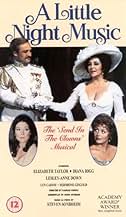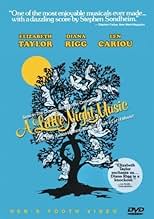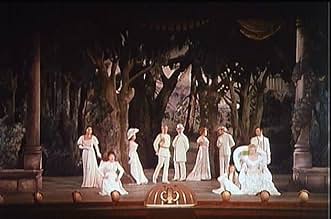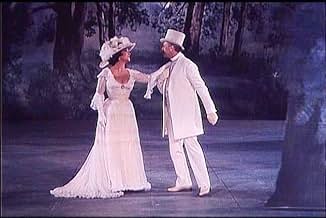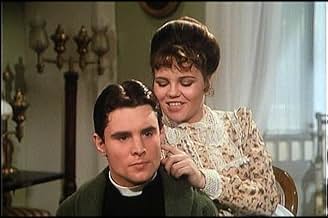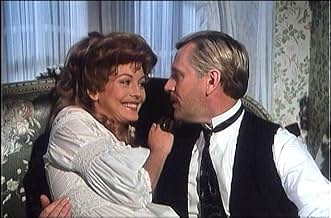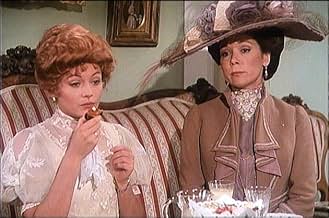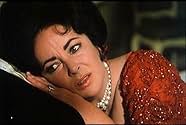NOTE IMDb
5,4/10
968
MA NOTE
Une actrice, son ex-amant marié, la femme de son amant actuel et d'autres invités se réunissent dans un domaine vers 1900.Une actrice, son ex-amant marié, la femme de son amant actuel et d'autres invités se réunissent dans un domaine vers 1900.Une actrice, son ex-amant marié, la femme de son amant actuel et d'autres invités se réunissent dans un domaine vers 1900.
- Réalisation
- Scénario
- Casting principal
- Récompensé par 1 Oscar
- 1 victoire et 1 nomination au total
Avis à la une
My one favorite part of this film has always been THE GLAMOROUS LIFE. If only the rest of the film had been as droll, dry, and on the mark as this segment. No one seems to have an opinion on Chloe Franks, the young actress playing Fredericka. I've always thought she was one of the best people in the film.
I love this Sondheim masterpiece and having seen what Sondheim considers the finest staging ever (New York City Opera) live and on video many times over, the movie still has significant virtues. It was widely panned and dismissed as if all the film critics secretly met and took a vote to hate it together. Yes, some songs have been cut and some themes (most sadly, Mme. Armfeldt's) basically eliminated. But there are still some truly definitive performances and beautifully mounted scenes. And Elizabeth Taylor is far from terrible in her part. Unfortunately the current film on video is in terrible deterioration. This film deserves to be preserved as a rare film adaptation in Sondheim library. Remember the horrible film versions of Funny Thing Happened..., South Pacific and other great Broadway musicals that received poor screen adaptations. Taken in context of how seldom movie versions successfully transfer to the screen, A Little Night Music is not great but is certainly good, and far better than many other movie musicals that seem to be held in higher esteem than they deserve.
The turgid screen adaptation of Stephen Sondheim's 1973 masterpiece A LITTLE NIGHT MUSIC is probably in the top five of worst adaptations of Broadway musical to the motion picture screen. The musical, based on the Ingmar Bergman film SMILES OF SUMMER NIGHT, follows the revolving lives of three couples who clearly at the beginning are mismatched and how they end up being with their soulmates by the end of the film. Elizabeth Taylor, looking fat and tired, sleepwalks her way through the film and enough has been said about her singing so I won't even go there. Director Hal Prince did have the sense to hire Len Cariou and Laurence Guittard to repeat their stage roles Freidrich and the Count, who both think they are in love with Desiree, but even these two charismatic actors come off as stilted. Lesley Ann-Downe is a lovely woman but she just looked way too old to be playing Freidrich's young wife, Anne, who in the original script, was 18. The only completely satisfying performance in the film is by Diana Rigg as the Countess, who brings so much more to the role than the screenplay allows and also surprisingly gives the film its loveliest musical moment with her rendition of "Every Day a Little Death." Speaking of music, I found it interesting that Prince felt the need to completely overhaul one of the most beautiful musical scores ever written for the stage. Hermione Gingold's role as Desiree's mother is reduced to a glorified cameo since they chose to cut her song, "Liasons". The Count also has a gorgeous solo in the show called "In Praise of Women" which was also cut. The song "The Glamorous Life" was rethought and became a solo for Desiree's daughter, Fredrika, charmingly played by Chloe Franks. They also cut "The Miller's Son" a powerhouse of a song sung by Petra, the maid. I could go on ad nauseum about what's wrong with this movie, but that would be pointless. I just cannot fathom how Hal Prince so horrifically screwed up the screen version of a musical HE directed on Broadway. In an eggshell, the only reason to see this film is if you live for Diana Rigg.
There are several misunderstandings about this woefully mis-guided film floating around.
First, Liz Taylor cannot be blamed for the sound of her singing -She was dubbed! I've heard her actual vocals -be very, very glad that another singer was used. Only Len Cariou, Diana Rigg, and Laurence Guittard's singing voices are their own.
The decision to move the locale from Sweden to Austria had nothing to do with art and everything to do with finances. The picture was financed by an Austrian company... And woefully underfunded, which limited neophyte director Prince's re-shoot options (re the ever-expanding, ever-contracting Liz).
Prince has said he simply couldn't figure out a way to use the vocal quintet for the film, so they and their songs were cut. Sondheim wrote new lyrics for Liaisons, and the song was filmed (as was In Priase of Women) but for some reason they were cut from the final version of the film. Perhaps length. Perhaps to keep the focus on the Cariou-Taylor plot line. The new version of The Glamorous Life was extremely well-done, and shows the potential of the piece in surer, better-financed hands.
Casting the film proved extremely difficult. Liz Taylor's name value was crucial to the production. Many different leading men were considered, and in the end Cariou was only brought in at the very last minute because no one else had been signed. Ditto with Laurence Guittard. It's ironic that their performances are the best in the film.
Most of the blame for this shambles falls on Hal Prince. He allowed the movie to be far too dark and Taylor to be far too desperate and clutching. Stephen Sondheim is said to have encouraged the dark tone. Perhaps another director would have lightened things up a bit and allowed the film to be more romantic and fun.
A DVD transfer is extremely unlikely -The original negatives are all but destroyed, not having been preserved properly. Image Entertainment had the title on their release list for some time, but eventually gave up on it, saying the original elements were unusable and the title not likely to sell nearly enough copies to make a restoration worthwhile. The sound, in particular, is problematic -as it was terrible to begin with. There is a very good laserdisc release of the film, which is much clearer than the VHS version, but it's exceedingly hard to find.
So -What was good about this film? The new Glamorous Life song/sequence worked wonderfully, as did the expanded Everyday A Little Death sequence. Cariou, Guittard, and Rigg gave excellent performances. Jonathan Tunick's new orchestrations and underscoring were, as always, first-rate -particularly during Erik's attempted suicide. (Tunick has a cameo as the conductor at the film's opening.) Prince's transition from the theatre stage to "real life" was well done, and the movie has a very promising start. Fans of the original stage musical will forever be frustrated by this film version, which could have been wonderful.
UPDATE: Since I wrote this the film has been (at last!) released on DVD, and the soundtrack recording is now on CD. Several reviewers have complained of the poor quality of the DVD, but the video and audio restoration work was extremely well done. The film never looked or sounded better. According to the new liner notes for the soundtrack CD there were four additional songs from the stage score that were to be filmed, but the production ran out of money. I'm upped my original rating of the film, as each time I see it I find more to enjoy.
First, Liz Taylor cannot be blamed for the sound of her singing -She was dubbed! I've heard her actual vocals -be very, very glad that another singer was used. Only Len Cariou, Diana Rigg, and Laurence Guittard's singing voices are their own.
The decision to move the locale from Sweden to Austria had nothing to do with art and everything to do with finances. The picture was financed by an Austrian company... And woefully underfunded, which limited neophyte director Prince's re-shoot options (re the ever-expanding, ever-contracting Liz).
Prince has said he simply couldn't figure out a way to use the vocal quintet for the film, so they and their songs were cut. Sondheim wrote new lyrics for Liaisons, and the song was filmed (as was In Priase of Women) but for some reason they were cut from the final version of the film. Perhaps length. Perhaps to keep the focus on the Cariou-Taylor plot line. The new version of The Glamorous Life was extremely well-done, and shows the potential of the piece in surer, better-financed hands.
Casting the film proved extremely difficult. Liz Taylor's name value was crucial to the production. Many different leading men were considered, and in the end Cariou was only brought in at the very last minute because no one else had been signed. Ditto with Laurence Guittard. It's ironic that their performances are the best in the film.
Most of the blame for this shambles falls on Hal Prince. He allowed the movie to be far too dark and Taylor to be far too desperate and clutching. Stephen Sondheim is said to have encouraged the dark tone. Perhaps another director would have lightened things up a bit and allowed the film to be more romantic and fun.
A DVD transfer is extremely unlikely -The original negatives are all but destroyed, not having been preserved properly. Image Entertainment had the title on their release list for some time, but eventually gave up on it, saying the original elements were unusable and the title not likely to sell nearly enough copies to make a restoration worthwhile. The sound, in particular, is problematic -as it was terrible to begin with. There is a very good laserdisc release of the film, which is much clearer than the VHS version, but it's exceedingly hard to find.
So -What was good about this film? The new Glamorous Life song/sequence worked wonderfully, as did the expanded Everyday A Little Death sequence. Cariou, Guittard, and Rigg gave excellent performances. Jonathan Tunick's new orchestrations and underscoring were, as always, first-rate -particularly during Erik's attempted suicide. (Tunick has a cameo as the conductor at the film's opening.) Prince's transition from the theatre stage to "real life" was well done, and the movie has a very promising start. Fans of the original stage musical will forever be frustrated by this film version, which could have been wonderful.
UPDATE: Since I wrote this the film has been (at last!) released on DVD, and the soundtrack recording is now on CD. Several reviewers have complained of the poor quality of the DVD, but the video and audio restoration work was extremely well done. The film never looked or sounded better. According to the new liner notes for the soundtrack CD there were four additional songs from the stage score that were to be filmed, but the production ran out of money. I'm upped my original rating of the film, as each time I see it I find more to enjoy.
Yes it's true, Hal Prince did really ruin his most sophisticated and gorgeous stage musical, by transferring the plot to turn of the century austria (nonsense), skipping the greek chorus and cutting some of the best songs of the show (the miller's son, Liaisons). Nevertheless, one has to be thankful, that the talents of the original broadway production were chosen to recreate their respective successes on screen, even if they finally have been butchered in the cutting room. Biggest miss is the final scene in which the night smiles for the third time and Mdm. Armfeldt (Hermione Gingold) passes away. Still, its the only thing visual, that's left from that great Broadway Cast and though I hate it, I love it.
Le saviez-vous
- AnecdotesMovie critic Stephen Farber listed this movie on his top ten movies of 1977 and wrote "Academy members should be required to see Diana Rigg's entrancing performance before they are allowed to vote for the best supporting actress."
- Citations
Fredericka Armfeldt: Gay and resilient, with applause, what a glamorous life! Speeches are brilliant, if they're Shaw's, what a glamorous life!
- ConnexionsFeatured in The 100 Greatest Musicals (2003)
Meilleurs choix
Connectez-vous pour évaluer et suivre la liste de favoris afin de recevoir des recommandations personnalisées
- How long is A Little Night Music?Alimenté par Alexa
Détails
Contribuer à cette page
Suggérer une modification ou ajouter du contenu manquant

